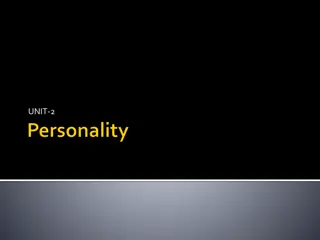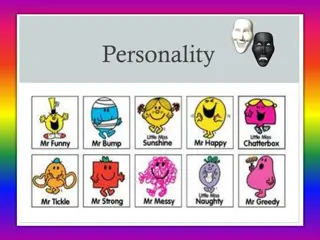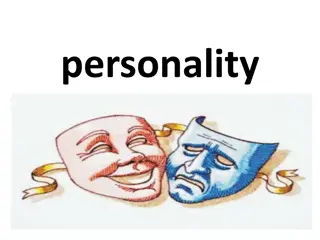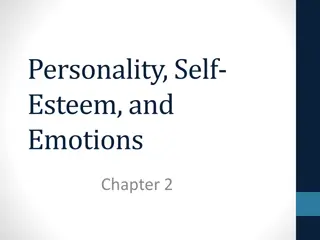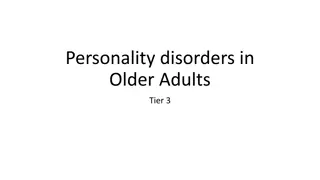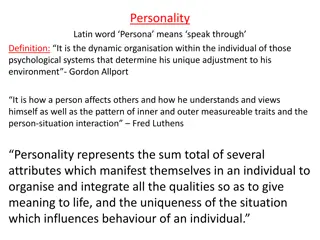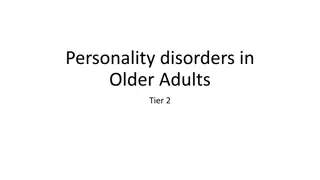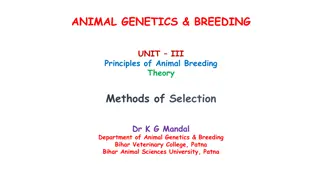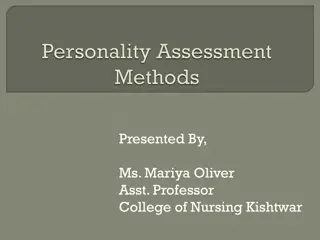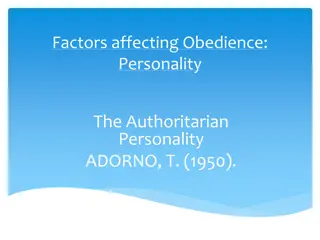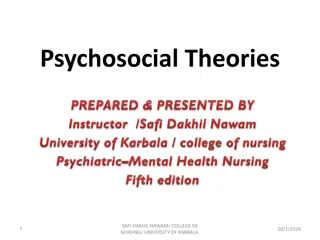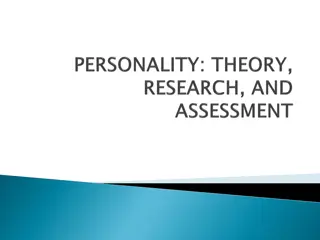Theories of Personality: Type Theory, Trait Theory, Psychoanalytic Theory
Personality theories such as Type Theory, Trait Theory, and Psychoanalytic Theory classify personality based on various factors like body build, introversion/extroversion, enduring characteristics, and unconscious forces influencing behavior.
Download Presentation

Please find below an Image/Link to download the presentation.
The content on the website is provided AS IS for your information and personal use only. It may not be sold, licensed, or shared on other websites without obtaining consent from the author.If you encounter any issues during the download, it is possible that the publisher has removed the file from their server.
You are allowed to download the files provided on this website for personal or commercial use, subject to the condition that they are used lawfully. All files are the property of their respective owners.
The content on the website is provided AS IS for your information and personal use only. It may not be sold, licensed, or shared on other websites without obtaining consent from the author.
E N D
Presentation Transcript
Theories of Personality Type Theory 1. 2. Trait Theory 3. Psychoanalytic Theory 4. Social Learning Theory 5. Self Theory
Type Theory Personality is classified on the basis of two Body build a. People with short or plump body build are sociable and relaxed b. People with tall and thin body build - restrained, self- conscious c. People with heavy muscular body noisy, fond of physical activities. 1.
2. Psychological a. Introverts : These kind of people process their thoughts and ideas within themselves, they avoid social contacts, b. Extrovert : They are simply speaking, friendly, sociable, lively, aggressive
Trait Theory It is an enduring characteristics ( shy, aggressive, lazy, ambitious, loyal etc)of a person in which they differ from another. It is described as individuals variables or dimensions. It is an attempt to understand how a set of personality variable exerts on ones behaviour
Psychoanalytic Theory Sigmund freud developed this theory Basic notion of this theory is that human behaviour is influenced more by unseen forces than conscious and rational thoughts Three elements of this theory are : Id 2. Ego 3. Super Ego 1.
ID is unconscious mind inherited- seeks pleasure- idea that all of once dreams should be met immediately-Like Devil or bad choice selfish. ID- Devil- Bad choice Super ego Angly Good choice Ego - Reality
EGO- Conscious mind- Test reality- Idea that the desire of ID must be satisfied in a method that is both socially appropriate and realistic. Super Ego- Preconscious mind- strive for perfection- It judges whether an action is right or wrong according to standards of society.
Id : Unconscious part of human personality . Mental agency containing everything inherited by birth and fixed in individuals constitution. (It seeks pleasure). Ego: Mental image does not satisfied needs , Reality must be considered( hungry person cannot be satisfied by only the image of food but he needs food to satisfy his hunger) Ego develops Id because of the necessity of dealing with real word. (test reality). Super Ego : To function constructively in a society one should acquire a system of value, ethics and attitudes which are reasonably compatible with the society. It judge whether an action is right or wrong according to standards of the society .
Social Learning Theory Most of the human behaviour is either learned or modified by learning. Learning is defined as any change in ones behaviour that occurs as a result of experience. Learning occurs in two ways a. Reinforcement (Learning Again) b. Observing others
The social learning theory focuses on behaviour patterns and cognitive activities in relation to the specific conditions that evoke, maintain or modify them. i.Competencies: Intellectual abilities, social skills and other abilities. ii. Cognitive Strategies: Habitual ways of selectively attending to information and organizing it into meaningful units. iii. Outcome expectations: Expectations about the consequences of different behaviours and the meaning of certain stimuli.
iv. Self regulatory systems and plans: Individual differences in self imposed goals, rules guiding behaviour, self-imposed rewards for success or punishment for failure and ability to plan and execute steps leading to a goal will lead to differences in behaviour. All of the above variables interact with conditions of the particular situation to determine what an individual will do in that situation. The social learning theorists also believe in reciprocal behaviour patterns i.e Relationship between situation and individual is of reciprocal pattern.
Self Theory Personality is described as phenomenological. Phenomenology is the study of individuals subjective experience, feelings and private concepts as well as his views of the world and self. It is composed of perception of I or Me Factors of Self Theory Self Image (Once own image) 2. Ideal Self (What one would like to look at life) 3. Looking Glass-Self (How others perceive individuals) 4. Real-Self (What one actually is i.e the reality) Perception may be same or different from reality. 1.


